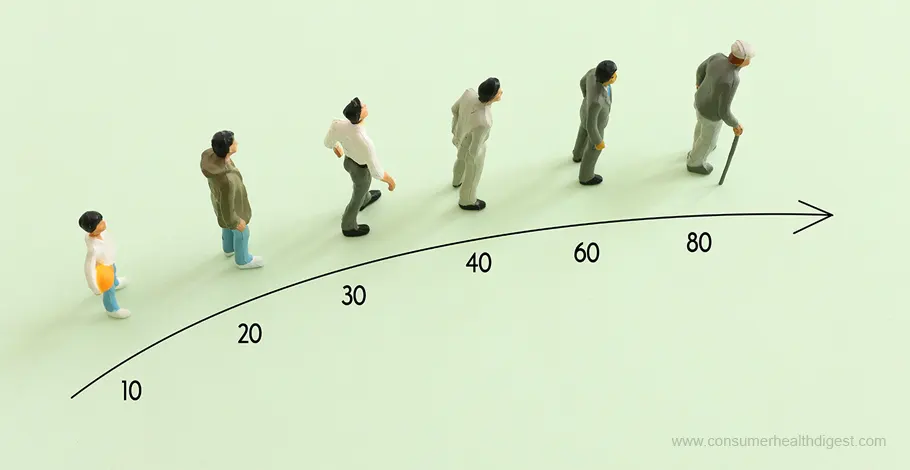In This Review
Introduction
Aging becomes more and more of a ringing bell as we age. At a fundamental level, we generally associate aging with how many years you’ve been alive, our chronological age. It is a completely flawed way to measure how old someone really is in terms of their ability to survive. That’s where the concept of biological age comes in — a more complete measure of how we’re actually functioning and aging.

In this context, biological age is the concept of the functional state of our cells, tissues and organs. It’s a relative measure that surrounds numerous factors that can either speed up or slow down the pace at which we age.
If you really think about it, aging is a lot more complicated than simply measuring the years! This difference in what age really is, the chronological number of years that we have been alive versus how old our bodies feel and function at a basal metabolic level[1].
By understanding the distinction between chronological age and biological age, we unlock valuable insights that can empower us to make informed choices and take proactive steps towards healthy aging.
What is the Chronological Age?
Let’s start with the basics. Your chronological age is simply the number of years you’ve been alive since the day you were born. It’s straightforward and easy to calculate—just count the candles on your birthday cake (or don’t, if you’d rather not know!). Chronological age is universally recognized and used for things like determining when you can vote, drink, or collect retirement benefits[2].
What is Biological Age?
Now, this is where things get interesting. Your biological age is a measure of how well (or poorly) your body is functioning compared to others in your age group. It’s similar to opening the hood of a car. You could open two hoods and find both cars are the same model year, but one can be in far better shape than the other
Your biological age is influenced by a whole host of factors, including your lifestyle choices (diet, exercise, stress levels), genetics, and even environmental exposures.
Dr. Nathan Price, a leading expert in the field of ageing, puts it this way:
“Your biological age reflects the cumulative impact of your lifestyle choices and environmental exposures over your lifetime.”
Why Biological Age Matters More than Chronological Age?
See, there are two people both aged 60 years chronologically — one individual would likely look much younger, more vibrant, full of energy and without degenerative illnesses associated with aging – the other may show all the signs we associate with looking far older than his years; wizened skin, poor mobility and multiple long-term health complaints.

Importance of Biological Age
This is where the importance of biological age comes starkly into play, giving a much better indication of an individual’s perception— one which acknowledges that our own bodies respond to aging differently[3].
There is a research survey conducted in 2023 that suggests that,
Biological age provides a better reflection of an individual’s physiological state and vulnerability to severe outcomes in critical illness contexts[4].
If you know your biological age it can help you understand various factors you can work on.
- Provides a More Accurate Assessment of Overall Health: Chronological age is just a number, but biological age gives a clearer picture of our body’s functional state. It considers various biomarkers which influence ageing.
- Reflects the Impact of Lifestyle Choices and Environmental Factors: Our Lifestyle and food choices significantly impact our biological age. Understanding these factors helps us make decisions to optimize health and slow biological aging.
- Predicts Risk of Age-Related Diseases: Studies show that those with older biological ages have a higher risk of developing age-related diseases like cardiovascular disease, diabetes, and certain cancers. Monitoring and managing biological age can reduce these risks for a longer, healthier life.
- Allows for Personalized Health Strategies: Biological age is influenced by various factors and can be tailored to an individual’s circumstances. Healthcare professionals can develop personalized interventions and lifestyle recommendations to address specific concerns and optimize health.
- Promotes a Proactive Approach to Healthy Aging: Focusing on biological age encourages a proactive approach to aging. By understanding our biological age, we can take preventive measures and make lifestyle changes that support healthy aging before issues arise.
Measuring Biological Age
So, how do you actually measure your biological age? There are a few ways that can tell you about your biological age.
Biomarkers and Testing Panels
Biomarkers are measurable indicators of your health. Common biomarkers include:
- DNA Methylation: This involves chemical changes to your DNA that regulate gene expression. Specific patterns, known as epigenetic clocks, can estimate biological age.
- Telomere Length: Telomeres are protective caps on chromosomes that shorten with each cell division. Shorter telomeres are associated with aging.
- Blood Biomarkers: These include cholesterol, glucose, inflammation markers, liver enzymes, and kidney function indicators.
- Hormone Levels: Hormones like cortisol, DHEA, and insulin can indicate biological age, with imbalances often signaling accelerated aging.
Advanced Testing Panels
Several companies, like Thorne, offer comprehensive testing panels that combine multiple biomarkers to estimate biological age. This panel uses cutting-edge machine learning and AI to analyze a bunch of different biomarkers such as:
- Metabolic Health: Blood sugar levels, lipid profiles.
- Cardiovascular Health: Cholesterol levels, blood pressure.
- Inflammation: Systemic inflammation markers.
- Organ Function: Liver and kidney enzyme levels.
Wearable Technology
Wearable devices can also provide data on lifestyle factors influencing biological age:
- Physical Activity: Daily steps, exercise intensity.
- Sleep Quality: Sleep patterns, duration, quality.
- Heart Rate Variability (HRV): Indicates cardiovascular health.
- Stress Levels: Monitored through HRV and other physiological signals.
Practical Steps to Measure Biological Age
- Choose a Test: Select a comprehensive biological age testing panel, like Thorne’s.
- Submit Samples: Follow the instructions to collect and submit samples.
- Review Results: Analyze your biological age and health of various systems.
- Implement Changes: Make recommended lifestyle changes—diet, exercise, stress management, and supplements.
- Monitor Regularly: Re-test periodically to track progress and adjust interventions.
By regularly measuring and monitoring your biological age, you can take proactive steps to improve your health and extend your health span.
Factors that Influence Biological Age
There are several key factors that can impact your biological age, and it’s important to understand and manage them. Let’s break down a few of the biggies:
Diet and Nutrition
What you eat (and don’t eat) plays a huge role in how quickly or slowly you age. This can be understood by an emphasis on the importance of getting enough protein, creatine, and vitamin D—all of which can help slow down the aging process. But don’t worry, we’re not talking about strict diets or deprivation here. It’s all about making smart, sustainable choices that nourish your body[5].
Additionally, Dr. Nathan Price says, “keeping your muscles, bones, and joints strong is key to staying active as you get older. Focus on protein-rich foods and strength training to maintain muscle mass, and consider supplements like creatine and vitamin D for added support.”
Exercise and Physical Activity
This one’s a no-brainer, right? Regular exercise, especially strength training, has been shown to have a major impact on biological age. It’s like hitting the reset button on your cells and tissues, keeping them functioning at a more youthful level. Plus, who doesn’t love the endorphin boost you get from a good sweat sash[6].

How to Improve Your Biological Age?
Gut Health
You might not think about it much, but your gut plays a big role in how you age. The trillions of bacteria that live in your gut (also known as your microbiome) can influence everything from inflammation levels to nutrient absorption. Taking a personalized approach to optimizing your gut health through things like probiotics and dietary changes can also help[7].
Stress Management
Chronic stress is basically biological age’s worst enemy. When you’re constantly in fight-or-flight mode, it takes a toll on your body, accelerating the aging process. Learning to manage stress through things like meditation, yoga, or just good old-fashioned self-care is crucial for keeping your biological age in check[8].
Dr. Nathan Price points out that if you’re stressed for a long time, it can cause heart problems, diabetes, depression, and more. But you can help yourself by meditating, spending time outdoors, and exercising regularly to lower these risks.
Sleep
Last but not least, quality sleep is essential for healthy aging[9]. When you’re sleep-deprived, it can mess with everything from your hormone levels to your immune function, both of which can impact your biological age. Aim for 7-9 hours of solid shut-eye each night, and watch how much better you feel (and potentially look!).
Improving Your Biological Age
Okay, so now you know what biological age is and what factors can influence it. It’s about time to implement simple adjustments now and keep track of how those changes impact your biological age as the months and years go on.
Additionally, regular check-ups and screenings with your doctor are a great way to keep you on the lookout for anything that might need improvement.
Here’s the good news: any lifestyle change, no matter how small it might seem, can have a big impact on inhibiting or even reversing your body’s biological age.
According to Dr. Nathan Price, “Our society promotes sedentary lifestyles and relies heavily on processed foods, impacting overall wellbeing. Many people are unaware of hidden health risks, underscoring the importance of taking personalized, proactive steps for healthy aging”.
There is also research by eLife published in 2022 that suggests that,
Unhealthy lifestyle is associated with accelerated biological aging[10].
Focusing on all of the factors which we discussed earlier can influence and you can live a healthy life. In other words, increasing protein intake, adding strength training and keeping that champagne beautiful in its cellar could actually have a beneficial effect on your biological age.
And hey, if nothing seems to work right away don’t get discouraged! Making your biological age younger is not a sprint, it’s a marathon. So just keep at it, and you’d be surprised that there’s every reason why you can feel younger, and better at any age, no matter what the calendar says.
Conclusion
Whew, that was a lot of information, but we hope it’s clear why understanding and focusing on your biological age is so important for living a long, healthy life. Your chronological age is just a number, but your biological age gives you a much more accurate picture of how well (or poorly) your body is actually functioning.
By paying attention to factors like diet, exercise, gut health, stress management, and sleep, you can actively manage and potentially improve your biological age. And who doesn’t want to look and feel younger than their years?
Remember, healthy aging isn’t about deprivation or following strict rules. It’s about making sustainable lifestyle choices that nourish your body and mind[11]. So, ditch the obsession with chronological age and start focusing on what really matters: your biological age. Your future self will thank you!
11 Sources
We review published medical research in respected scientific journals to arrive at our conclusions about a product or health topic. This ensures the highest standard of scientific accuracy.
[2] How to Calculate Chronological Age : https://www.thetechedvocate.org/how-to-calculate-chronological-age/
[3] Here's why your biological age is a better health indicator than your actual age : https://www.weforum.org/agenda/2023/03/heres-why-your-biological-age-is-a-better-health-indicator-than-your-actual-age/
[4] Biological age is superior to chronological age in predicting hospital mortality of the critically ill : https://www.ncbi.nlm.nih.gov/pmc/articles/PMC10543822/
[5] The Science of Food & Aging : https://www.harvardpilgrim.org/hapiguide/the-science-of-food-and-aging/
[6] How can strength training build healthier bodies as we age? : https://www.nia.nih.gov/news/how-can-strength-training-build-healthier-bodies-we-age
[7] Exploring the Relationship between the Gut Microbiota and Ageing: A Possible Age Modulator : https://www.ncbi.nlm.nih.gov/pmc/articles/PMC10218639/
[8] Telomeres and aging : https://pubmed.ncbi.nlm.nih.gov/18391173/
[9] Sleep and Healthy Aging: A Systematic Review and Path Forward : https://pubmed.ncbi.nlm.nih.gov/35445642/
[10] The role of adolescent lifestyle habits in biological aging: A prospective twin study : https://www.ncbi.nlm.nih.gov/pmc/articles/PMC9642990/
[11] Life’s Essential 8 comprises two major areas: Health Behaviors and Health Factors: https://www.heart.org/en/healthy-living/healthy-lifestyle/lifes-essential-8








 This article changed my life!
This article changed my life! This article was informative.
This article was informative. I have a medical question.
I have a medical question.
 This article contains incorrect information.
This article contains incorrect information. This article doesn’t have the information I’m looking for.
This article doesn’t have the information I’m looking for.